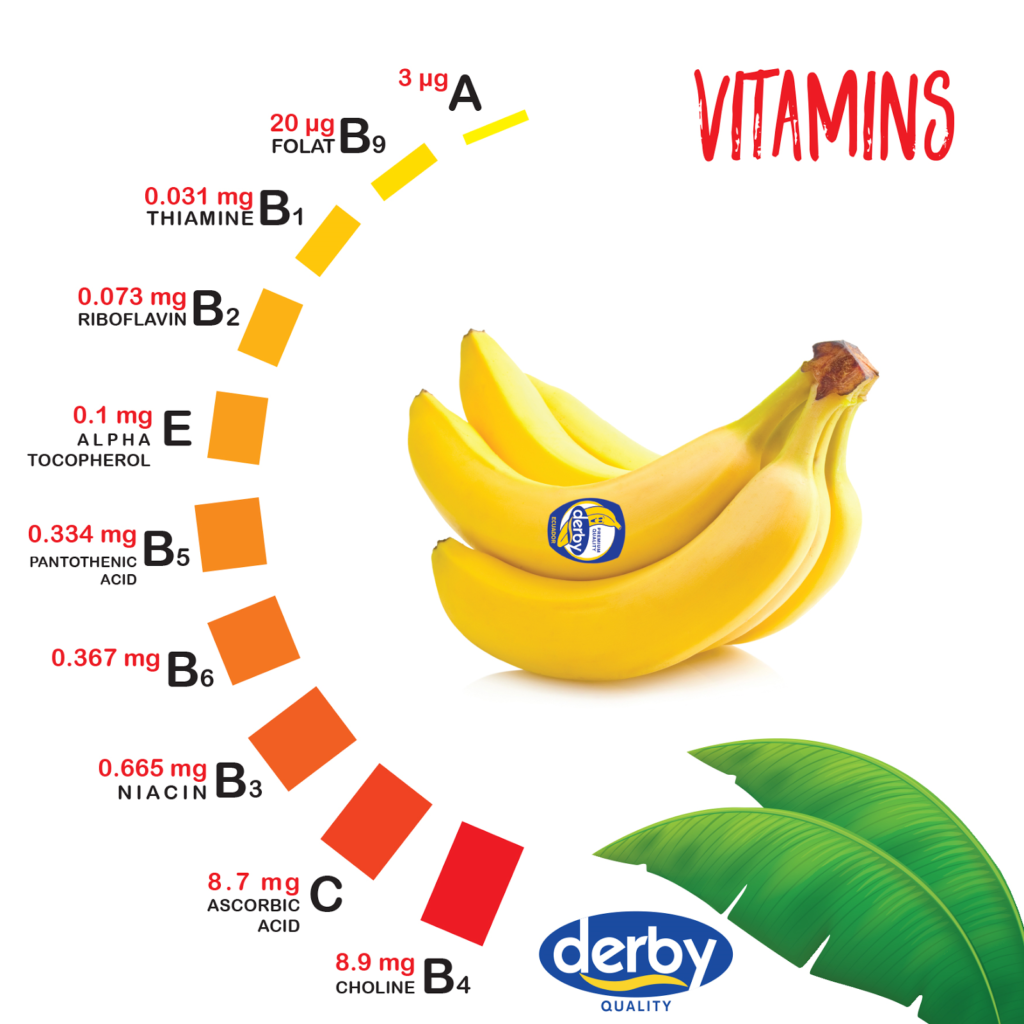Bananas are a beloved fruit worldwide, known for their sweet taste, creamy texture, and convenient portability. But beyond being delicious, bananas are also packed with nutrients that contribute to a balanced diet. One of the most notable aspects of bananas is their vitamin content. So, what vitamins do bananas provide, and how can they benefit your health?
Vitamin B6: The Star Vitamin in Bananas
The primary vitamin found in bananas is Vitamin B6 (also known as pyridoxine). This water-soluble vitamin plays a crucial role in various physiological functions. One medium-sized banana typically contains around 0.4 mg of Vitamin B6, which accounts for about 20% of the recommended daily intake for adults.
Health Benefits of Vitamin B6:
- Supports Brain Health: Vitamin B6 is vital for producing neurotransmitters, chemicals in the brain that regulate mood, memory, and sleep. It’s also essential for cognitive function, helping to maintain mental clarity and focus.
- Boosts Metabolism: Vitamin B6 aids in the breakdown of proteins, fats, and carbohydrates. This function supports the body’s metabolism, making it easier to convert food into energy.
- Promotes Red Blood Cell Formation: This vitamin plays an essential role in the creation of hemoglobin, which helps transport oxygen through the blood and prevents anemia.
- Supports Immune Function: Vitamin B6 is critical for maintaining a healthy immune system by helping produce antibodies and other cells that fight infections.
Vitamin C: A Supporting Player
Bananas are also a source of Vitamin C, though in smaller amounts compared to fruits like oranges or strawberries. A medium-sized banana provides about 10% of the recommended daily intake of Vitamin C. This vitamin is vital for the growth and repair of tissues in the body.
Health Benefits of Vitamin C:
- Antioxidant Properties: Vitamin C acts as an antioxidant, helping to neutralize harmful free radicals and reduce oxidative stress. This can potentially lower the risk of chronic diseases such as heart disease and cancer.
- Collagen Production: Vitamin C is essential for the production of collagen, a protein that helps to maintain skin elasticity and wound healing.
- Enhances Iron Absorption: Consuming Vitamin C with iron-rich foods can improve the absorption of non-heme iron, which is important for those on plant-based diets.
Other Nutrients in Bananas
While Vitamin B6 and Vitamin C are the standout vitamins in bananas, these fruits also provide a variety of other essential nutrients, including:
- Vitamin A: Bananas contain small amounts of Vitamin A, which supports vision, skin health, and immune function.
- Folate (Vitamin B9): Folate is crucial for cell division and the formation of DNA. It’s especially important for pregnant women as it helps prevent neural tube defects in the developing fetus.
- Potassium: Bananas are most famous for their potassium content, which is essential for maintaining healthy blood pressure and muscle function.
- Magnesium: This mineral is important for muscle and nerve function, energy production, and bone health.
How to Make the Most of Bananas’ Vitamin Content
To maximize the absorption of these vitamins, consider pairing bananas with other nutrient-dense foods. For example, combine a banana with a handful of nuts for a snack that boosts both Vitamin B6 and healthy fats. Or, add bananas to a smoothie with spinach or citrus fruits to increase the Vitamin C intake and improve absorption.

Conclusion
Bananas are more than just a tasty, convenient snack—they are a valuable source of Vitamin B6, Vitamin C, and other essential nutrients. Whether you’re looking to boost brain function, support your immune system, or enhance your metabolism, adding bananas to your diet can provide a range of health benefits. So, next time you grab a banana, remember that it’s not only a great source of energy, but it’s also packed with vitamins that nourish your body in numerous ways.



